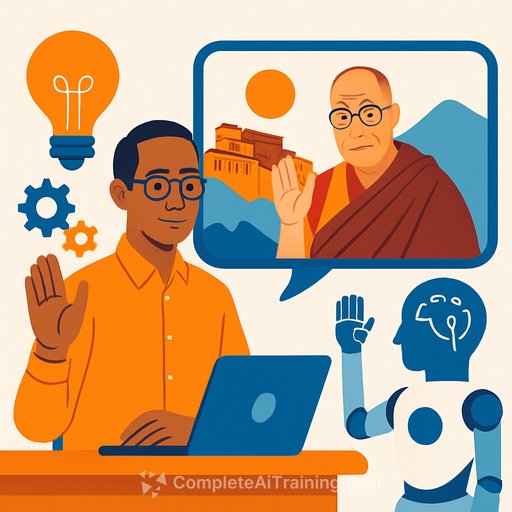Professor to Share AI Teaching Insights on World Stage
University of Mississippi professor Robert Cummings will join an international group of scholars, scientists, and Buddhist teachers in Dharamsala, India, for the Mind & Life Institute's "Minds, Artificial Intelligence and Ethics Dialogue," Oct. 14-16. The gathering, hosted with the Dalai Lama Trust and the Private Office of the Dalai Lama, will examine risks and untapped potential of AI through a human-centered lens.
"There's this rush in the AI development community to produce the most powerful AI tech possible, regardless of its consequences or how those downstream effects impact people who were not part of the decisions during development," Cummings said. "This conference asks, from the outset, a series of ethical questions that seem to automatically be bypassed, sometimes in a capitalist society."
Why this matters for educators
Education is one of five core topics at the dialogue, with sessions that blend research, policy, and contemplative practice. "As artificial intelligence reshapes our world, this gathering offers a vital space to reflect together on how we can infuse technology with compassion, ethics, and a commitment to the flourishing of all," said Suzanne Bond, president of the Mind & Life Institute.
Who's speaking on education
- Robert Cummings, professor of writing and rhetoric and executive director of the Academic Innovations Group at the University of Mississippi
- Ani Choyang, Tibetan nun and science teacher at Jangchub Choeling Nunnery in Mundgod, India
- Marieke van Vugt, associate professor in the cognitive modeling group at the University of Groningen, Netherlands
- Chiara Mascarello, researcher at Ca' Foscari University of Venice
Key issues Cummings will address
Cummings researches digital writing and how predictive tools like Google Smart Compose affect creativity and cognition. He notes these aids can interrupt students' thinking and skill-building by finishing sentences before ideas form.
His talk will cover AI use at American colleges and universities, the pitfalls of blanket bans, evidence-based teaching strategies from the Academic Innovations Group, and student well-being. "The advent of agentic AI and increasingly more emotional AI will become an even bigger issue this year, possibly resulting in mental health effects," he said.
He cautions that students are turning to chatbots for private conversations on topics like social advice and emotional support-roles these systems were never intended to fill. Clear guidance and support structures are needed.
Practical moves you can make now
- Set clear classroom norms: define allowed, discouraged, and prohibited AI uses for each assignment.
- Build a pause into the workflow: ask students to use an AI tool for a specific task, then stop and write a short reflection on what helped, what misled, and what they learned.
- Design for process, not shortcuts: require planning notes, drafts, citations of AI prompts/outputs, and a brief critique of tool quality.
- Teach data and model awareness: discuss bias, hallucinations, privacy, and where systems may substitute convenience for thinking.
- Offer safe alternatives for support: remind students where to seek academic advising and mental health resources instead of relying on chatbots.
- Replace bans with guardrails: limit AI to brainstorming, outlining, or feedback tasks while keeping core reasoning and evidence in the student's hands.
- Assess metacognition: grade the reflection and decision-making as much as the final product.
Dialogue format and livestream
Each session will be livestreamed and includes time for intentional reflection before moderated Q&A. This mirrors Cummings' approach: use the tool, then reflect to turn technology into a learning opportunity rather than a shortcut.
Register for the livestream via the Mind & Life Institute.
Context and perspective
A Wiki Education board member, Cummings last visited India about 14 years ago and previously met Thich Nhat Hanh during the Vietnamese monk's visit to Magnolia Grove Monastery in Mississippi. Though not a follower of Buddhism, he welcomes the chance to engage with India's mindful culture, with the dialogue coordinated alongside the Dalai Lama Trust as the 14th Dalai Lama marks his 90th year.
"I can't imagine a more essential conversation that we need to be having," Cummings said. "This is a technology that is important for everyone across the globe to understand and to have some sort of self-determination in how they interact with it."
For educators building AI fluency
If you're developing practical AI skills aligned to your role, explore curated options by job function at Complete AI Training.
Your membership also unlocks:

